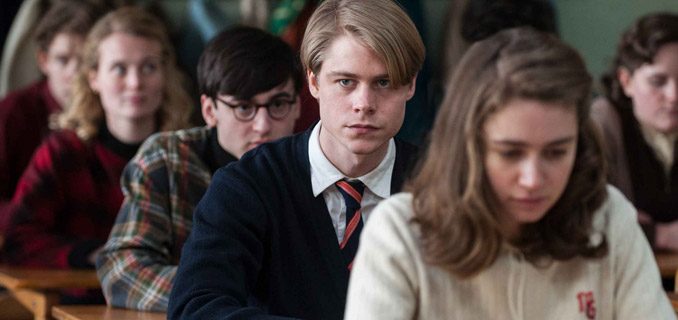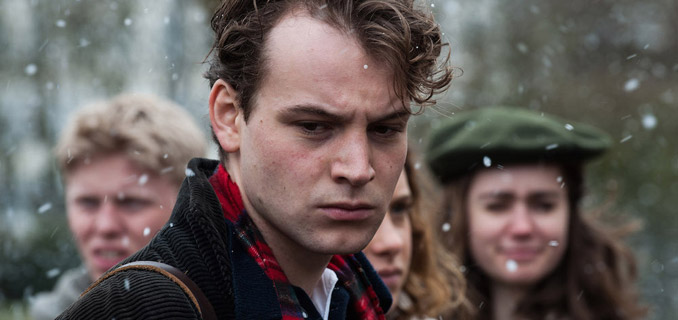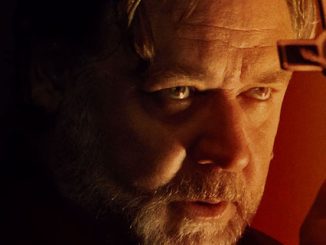
Most years the German Film Festival allows reviewers to simply trot out that same tired old cliche about Germans having no sense of humour. And repeat the commonly held view – that German filmmakers, burdened with the collective weight of the nation’s disastrous recent history, are simply incapable of “lightening up”.
Well now, if you smirked your way through DeadPool 2 or were one of those who helped make Avengers: Infinity War Australia’s highest grossing film this year ($45m and counting) then, it’s true, maybe you should give the German Film Festival, which Palace Cinemas this month welcomed back to our screens after a years absence, a miss… And yes, while it is true that German cinema tends to be somewhat earnest and its humour dark, they actually do make the sort of profanity-laced silliness (the inelegantly named Fack ju Göhte triology for example) that now passes for mainstream entertainment the world over. The much better news though, is that the 2018 festival also unveiled a couple of small German masterpieces, two discoveries that should, if there was any rhyme or reason in the programming decisions of our art-house cinemas, be instantly grabbed for future general release. Let’s hope these two gems are:
Three Peaks
The reference to “Force Majuere style unease” in the GFF program guide made checking out director Jan Zabeil’s icily disturbing family drama set in the Dolomites compulsory – to my mind, anyway. The Square’s Ruben Östlund’s pitch black Force Majuere is one of Europe’s greatest and most subversive of comedies, and as well, those Italian mountains are one of the most stunningly scenic places on the planet. Now sure, both movies are about family disharmony, and both are set in mountains – but there the similarity ends. For one thing there isn’t a single joke, dark or otherwise in Three Peaks. In fact one critic (somewhat harshly – it was way too much for him) labelled it “as serious as a heart attack.”

Ok, so be brave, this is German cinema at its most intense and deadly. Aaron (Alexander Fehling) and Lea (Bérénice Bejo) take 8 or 9 year-old Tristan (Arien Montgomery, an astonishing young actor) on a hiking holiday to stay in a remote cabin in the mountains, and all seems well at first. Aaron is the perfect dad, handsome, masculine and outdoorsy in that contemporary hipster way, as handy with an axe chopping firewood as he is gently teaching his son to play the piano. Only Tristan isn’t his biological son – his real dad and Lea’s ex is still an ominous presence on the end of a mobile phone (great reception in those European mountains). Lea is consumed with guilt about the break-up too, and there’s something else wrong as well, something that goes beyond Tristan’s seemingly sullen resentment about his old world being torn asunder by his mum’s new love. For a good two thirds the tension is expertly wracked up slowly by exchanges which are normal on the surface, but all seem just a bit off. Something is inexplicably wrong here. The final act, Aaron and Tristan’s hike up the peak to watch an incredible mountain sunrise – for a while turns the movie into a grim survival drama, but tautly twists itself into something else again – much worse than every parent’s worst nightmare. No, its not obvious and you won’t guess the ending, which could well be a step too far for some viewers. Just be warned: Make sure you’ve recently had a cardiac check-up before buying a ticket. ★★★★★ Trailer and info here
The Silent Revolution
East Germany’s first decade, when socialism was new and hopes for a better world amongst its young hadn’t yet been extinguished by the brutal reality of Soviet domination, is a period not often examined in German cinema. Lars Kraume’s feature takes place in 1956 – five years before the wall went up – when anyone from the East could cross over freely if they had reason to do so. For two final-year high school students Theo (Leonard Scheicher) and Kurt (Tom Gramenz), that reason was to go see a titty movie (the Germans have always been keen on nudity, even then), and like good young communists, sneak in without paying the decadent capitalist cinema owner. But they’re brutally shocked by newsreel footage of the uprising in Hungary – the ferocity of its putdown at striking odds to what they’ve been told by the state-run media back home. Once back at school in Stalinstadt, Kurt’s bright idea is to lead a minute of silence to honour the deaths of Hungarian workers. Most of the class join in, but uh oh… bad move – few of the idealistic young socialists realised that they were now in direct confrontation with the ideology of the evolving Stasi state. Pretty soon even the Peoples Education Minister (a scarily intimidating Burghart Klaussner) pays a visit, determined to get to the bottom of this adolescent counter-revolution and weed out its deviant ring leaders.

Heroic proletarian solidarity only goes so far, the teens discover, and soon enough the implications of their rebellious act become obvious. Divisions open up, and Kraume’s approach here is heavy-handed (hey, this is a German film) and overly melodramatic, but does crushingly convey just how the behavioural control mechanisms of an authoritarian state work at the personal and familial level. Both the boys’ performances are fantastic, and there’s a romantic triangle involved too just to make everything murkier for the poor hormone-addled young comrades. I half expected a dismal East German coda to this story – to be told in a onscreen afterword – that the class leaders went on to become Stasi agents or something. But fortunately, that’s not what happened – this is based on a true story, and the climax is as exciting, tense and moving as it is inspiring. “Workers of the world unite!” Yeah, yeah, got it… ★★★★1/2 Trailer and info here.
Reviews – Russell Edwards


